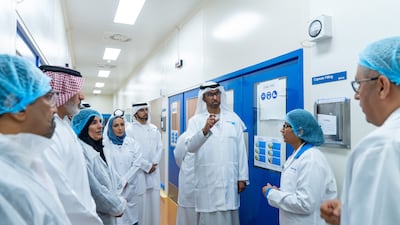The UAE has witnessed a transformative surge in its industrial landscape, bolstered by strategic initiatives and robust legislative reforms, since the establishment of the Ministry of Industry and Advanced Technology in 2020, Dr Sultan Al Jaber, Minister of Industry and Advanced Technology, has said.
The Arab world's second-largest economy has recorded a 49 per cent increase in the industrial sector's contribution to the gross domestic product, reaching Dh197 billion ($53.6 billion), since the creation of the ministry, while industrial exports have surged 60 per cent to Dh187 billion, Dr Al Jaber told state-owned news agency Wam.
Industrial productivity has increased by 18 per cent compared to 2020 and the UAE was ranked first regionally and 29th globally last year in a UN agency’s competitive industrial performance index, climbing seven spots since 2020.
The surge is underpinned by various programmes such as the National In-Country Value (ICV) programme, through which more than Dh237 billion being spent outside the UAE was redirected into the national economy, Dr Al Jaber said.
So far, 16,000 Emiratis have been employed across ICV-certified companies.
“We focused on two main pillars – the first is boosting in-country value in the national industrial sector while also enhancing the value add of manufacturing.
“The second is providing more valuable opportunities to the industrial sector, whether it is through investment opportunities or facilitating access to global markets, as well as attracting foreign investments in advanced industries,” Dr Al Jaber said.

The UAE also launched its industrial strategy, Operation 300bn, in 2021 to position the country as an industrial centre by 2031.
The 10-year strategy focuses on increasing the industrial sector’s contribution to gross domestic product to Dh300 billion by 2031, from Dh133 billion in 2021.
The ministry also launched initiatives to facilitate easy financing and minimise risks for industrial companies.
Last year, it provided Dh5.3 billion in financing solutions for the industrial sector in co-operation with its partners including Emirates Development Bank, First Abu Dhabi Bank and Mashreq Bank.
Dr Al Jaber said the introduction of Federal Decree Law No. 25 of 2022 boosted the UAE’s industrial hub status, characterised by ease of doing business and a unified industrial law that supports companies to keep pace with national and global trends.
The UAE also launched the Make it in the Emirates initiative that encourages local and international investors to manufacture and export products from the UAE.
In partnership with 12 national companies, the ministry, through the forum, introduced 1,400 products that can be manufactured locally with a value of Dh120 billion.
Almost 51 per cent of these product offtake opportunities, totalling Dh62 billion, have already been awarded, Dr Al Jaber said.
The MoIAT ministry also launched a Technology Transformation Programme to enhance the competitiveness and sustainability of the national industrial sector.
As part of the programme, it launched the industrial technology transformation index to measure the technological maturity and sustainability of factories, and develop a future road map.
“Through the index, 153 technology transformation road maps have been developed, resulting in an estimated Dh600 million in advanced technology investments and 360 hi-tech jobs created in companies participating in the Technology Transformation Programme.”
Achievements since MoIAT's inception:
- Industrial sector's contribution to GDP increased by 49 per cent, reaching Dh197 billion
- Industrial exports surged by 60 per cent to Dh187 billion in 2023
- National ICV programme redirected Dh237 billion into the national economy
- 16,000 Emiratis employed across ICV-certified companies
- UAE's ranking in UN's frontier technologies readiness index improved to 37th globally
- Make it in the Emirates forum introduced 1,400 products with a value of Dh120 billion


